Silver Tubes is a leading stainless steel round bar manufacturer in India, delivering high-quality rods, bars, and wires that meet international standards such as ASTM, ASME, DIN, and JIS. We produce stainless steel, carbon steel, and alloy steel products through precision rolling, drawing, heat treatment, and finishing to guarantee higher durability, strength, and corrosion resistance.
Our round bars come in hot-rolled, cold-drawn and forged materials and are used in engineering, construction, and manufacturing fields. Rods, which usually have a lower diameter, find application in machining, structural applications and fasteners, while wires cater to electrical, automotive, and industrial purposes. Adhering to strict specifications regarding diameter, length, chemical composition, and mechanical properties.
For bulk orders or special requirements, get in touch with Silver Tubes today and experience better quality and precision-engineered products that meet your specifications!
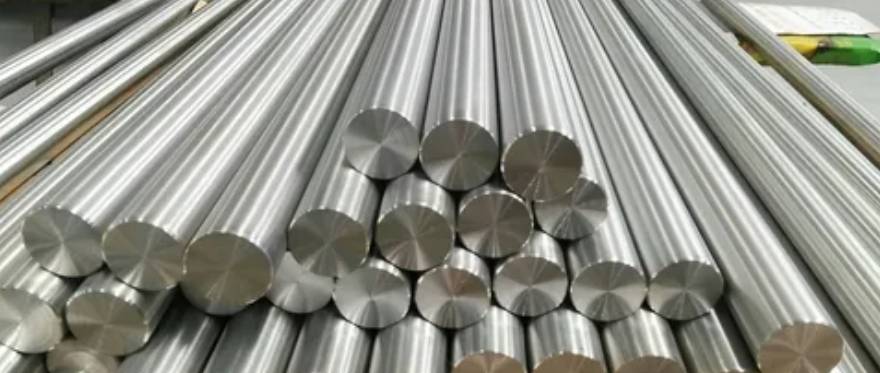
Round Bars, Rods, and Wires are vital metal products that are utilized across a range of industries due to their strength, versatility and ease of working. Though all three have a cylindrical shape, they vary in terms of diameter, flexibility, and practical application, which determines their specific applications.
Round Bars are solid cylindrical metal bars with a larger diameter, offering rigidity and strength. They are primarily used in structural frameworks, machining, and fabrication projects—ideal for load-bearing components and industrial tools.
Rods are of small to medium diameter and are more accurate in size. They are usually applied where fine tolerances are desired, such as for automotive components, electronic devices or critical engineering use. Their precision and size enable them to be used for light or custom mechanical components.
Wires are the most flexible and thinnest of the three, designed to be bent, twisted or coiled without breaking. They are most often utilized in electrical, telecommunication, automotive, and industrial applications where flexibility and conductivity are essential.
Each of these products plays a vital role across sectors such as construction, transportation, energy, manufacturing, and electronics, with their size and design tailored to meet specific structural, mechanical or electrical requirements.
Carbon Steel
A strong, durable, and cost-effective material made of iron and carbon. Characterized by high tensile strength, excellent weldability and structural and manufacturing versatility.
Stainless Steel
An iron-based alloy with chromium content (usually above 10.5%) offering excellent corrosion resistance, durability, and a clean finish. Widely used for its strength and resistance to oxidation.
Alloy Steel
Steel is combined with alloying elements like chromium, molybdenum, or nickel to improve strength, hardness, toughness, and resistance to wear or heat. Ideal for demanding mechanical and thermal conditions.
Nickel Alloys
High-performance nickel-containing metal alloys with a high percentage of nickel. Renowned for outstanding corrosion resistance, heat stability, and mechanical strength even in harsh conditions.
Other Materials
Includes specialized metals such as Titanium, Copper-Nickel, Brass, Bronze, and Aluminum, which are known for their special attributes like light weight, corrosion protection, thermal conductance, or aesthetic appeal.
The round bar and a wire rod are produced by a systematic series of operations that guarantee dimensional precision, strength and surface finish in accordance with the requirements of different engineering and industrial uses.
Raw Material Preparation
Hot Rolling (for Bars and Rods)
Cold Drawing (for Wires and Bars)
Wire Drawing (for Wires)
Additional Processes
The major advantage of round bars, rods and wires is that they can be used in many industrial applications, giving strength, durability and flexibility to suit manufacturing, construction and engineering requirements. The following are the most important advantages of round bars, rods, and wires:
Durability
Round bars, rods, and wires are made of high-strength materials like carbon steel, stainless steel, and alloys with high durability. They withstand wear, pressure and impact to provide long operational life in harsh working environments.
Corrosion Resistance
Stainless steel and nickel alloy variants provide exceptional resistance to corrosion, oxidation, and rust. This makes these products ideal for use in moisture-prone, chemical, or marine environments without degrading over time.
High Load-Bearing Capacity
Round bars are specifically engineered to support heavy loads due to their solid structure and strong tensile strength. They are commonly applied in building and infrastructure where strength and dependability are paramount.
Machinability
These materials are easily machined, drilled, cut and shaped without losing their integrity. This enables effective fabrication of parts in the automotive, tooling, and mechanical engineering industries.
Versatility
Available in various materials, sizes, and grades, round bars, rods and wires can serve multiple functions across sectors, from structural reinforcement to delicate electronic parts because of their adaptability.
Flexibility (For Wires & Rods)
Wires and thinner rods are known for their flexibility, and ease of forming into intricate shapes. This property is critical in electrical wiring, springs, and mesh applications where bendability is essential.
Temperature Resistance
Some grades of these materials have been engineered to perform well in harsh temperatures, both high and low. These are perfect for use in thermal stress or thermal cycling exposure applications.
Customization Options
Round bars, rods, and wires can be manufactured in specialized dimensions, finishes, and alloys to suit particular project specifications. This maximizes performance and compatibility in a wide range of engineering applications.
Cost-Effective Solution
Due to their durability, long lifespan, and reduced maintenance needs, these products offer excellent value for money. Their availability in standard and customized options makes them an economical choice for both large-scale and specialized projects.
Steel round bars and rods are available in various grades, sizes, dimensions, and finishes to meet diverse industrial applications. Below are the given specifications:
| Type | Common Grades | Diameter Range | Standards | Applications |
| Mild Steel (MS) | IS 2062, ASTM A36, SAE 1018 | 6 mm to 300 mm | IS, ASTM | General fabrication, construction, automotive |
| Carbon Steel | C45, EN8, EN9, SAE 1045 | 10 mm to 250 mm | ASTM A29, DIN 17200 | Shafts, axles, bolts, machinery parts |
| Alloy Steel | EN19, EN24, 42CrMo4, 8620 | 12 mm to 250 mm | ASTM A322, AISI, SAE | Gears, shafts, transmission components |
| Stainless Steel | SS 304, SS 316, SS 410, SS 420, SS 303 | 3 mm to 150 mm | ASTM A276, A479 | Food & pharma, marine, architectural |
| Tool Steel | D2, D3, H11, H13, M2 | 16 mm to 100 mm | ASTM A681 | Dies, punches, cutting tools |
| Bright Bar | 1018, EN1A, EN8D | 6 mm to 100 mm | ASTM, AISI | Precision components, fasteners, fittings |
| Hex / Square Bar | MS, SS, Alloy grades | 6 mm to 75 mm | IS, ASTM | Nuts, bolts, industrial hardware |
| Spring Steel Rod | EN42, EN47, SUP9 | 6 mm to 50 mm | AISI, DIN | Suspension parts, springs |
| Forged Round Bar | 4140, 4340, SS 316L, Duplex | 100 mm to 1000 mm | ASTM, ASME, EN | Heavy shafts, flanges, pressure vessel parts |
The chemical composition of steel round bars and rods includes key elements that determine their mechanical properties and performance.
| Grade | C (%) | Mn (%) | Si (%) | S (%) | P (%) | Cr (%) | Ni (%) | Mo (%) | Remarks / Notes |
| Mild Steel (IS 2062 / A36) | 0.25 max | 0.40–0.90 | 0.15–0.30 | 0.050 max | 0.050 max | — | — | — | General purpose structural steel |
| EN8 (C45) | 0.40–0.50 | 0.60–0.90 | 0.10–0.35 | 0.050 max | 0.050 max | — | — | — | Medium carbon steel, good machinability |
| EN9 | 0.50–0.60 | 0.50–0.80 | 0.05–0.30 | 0.050 max | 0.050 max | — | — | — | Higher strength than EN8 |
| EN19 (4140) | 0.36–0.44 | 0.60–0.90 | 0.10–0.35 | 0.040 max | 0.040 max | 0.90–1.20 | — | 0.15–0.25 | High tensile alloy steel |
| EN24 (4340) | 0.36–0.44 | 0.45–0.70 | 0.10–0.35 | 0.040 max | 0.035 max | 0.70–0.90 | 1.30–1.70 | 0.20–0.30 | High strength, good toughness |
| SS 304 | 0.08 max | 2.00 max | 0.75 max | 0.030 max | 0.045 max | 18–20 | 8–10.5 | — | Austenitic stainless, corrosion-resistant |
| SS 316 | 0.08 max | 2.00 max | 0.75 max | 0.030 max | 0.045 max | 16–18 | 10–14 | 2–3 | Marine-grade stainless steel |
| SS 410 | 0.15 max | 1.00 max | 1.00 max | 0.030 max | 0.040 max | 11.5–13.5 | — | — | Martensitic SS, good hardness & wear |
| D2 Tool Steel | 1.40–1.60 | 0.60 max | 0.60 max | 0.030 max | 0.030 max | 11.00–13.00 | — | 0.70–1.20 | High carbon, high chromium tool steel |
| Spring Steel (EN47) | 0.50–0.60 | 0.70–1.00 | 0.10–0.35 | 0.040 max | 0.040 max | 0.70–1.20 | — | — | Excellent elasticity for suspension parts |
Explore the dimensions and size chart of various steel round bars to find the perfect fit for your application.
| Size | Finished Hex Nuts | Heavy Hex Nuts | Finished Jam Nuts | Heavy Hex Jam Nuts | Square Nuts | Heavy Square Nuts |
| 1/2" | 3.75 | 6.54 | 2.62 | 4.00 | 5.78 | 7.87 |
| 5/8" | 7.33 | 11.9 | 4.93 | 6.96 | 10.8 | 14.3 |
| 3/4" | 11.9 | 19.3 | 7.70 | 11.0 | 15.4 | 23.5 |
| 7/8" | 19.0 | 29.7 | 12.0 | 16.7 | 24.5 | 36.2 |
| 1" | 28.3 | 42.5 | 17.6 | 23.5 | 36.3 | 51.5 |
| 11/8" | 40.3 | 59.2 | 24.7 | 32.4 | 52.5 | 72.4 |
| 11/4" | 54.3 | 78.6 | 36.1 | 45.8 | 70.6 | 95.5 |
| 13/8" | 73.0 | 102 | 47.9 | 59.3 | 94.5 | 125.0 |
| 11/2" | 94.3 | 131 | 60.9 | 74.8 | 122 | 161 |
| 15/8" | 162 | 91.6 | ||||
| 13/4" | 151 | 204 | 100 | 114 | ||
| 17/8" | 241 | 134 | ||||
| 2" | 224 | 299 | 140 | 165 | ||
| 21/4" | 419 | 227 | ||||
| 21/2" | 564 | 332 | ||||
| 23/4" | 738 | 429 | ||||
| 3" | 950 | 545 | ||||
| 31/4" | 1194 | 651 | ||||
| 31/2" | 1526 | 851 | ||||
| 33/4" | 1812 | 1005 | ||||
| 4" | 2180 | 1200 |
Silver Tubes provides different forms of Steel round bars, which are categorized on the basis of the type of steel used for making them. Below are some common types of bars
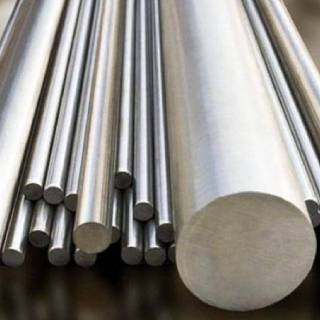
Stainless Steel Round Bar
Stainless Steel Round Bars possess excellent corrosion resistance, high strength, and durability. These bars find applications in chemical processing, food industries and marine environments, providing a long service life with low maintenance.
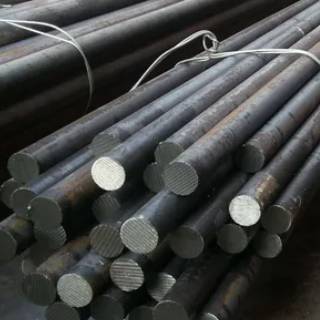
Carbon Steel Round Bar
Carbon Steel Round Bars offer high tensile strength and wear resistance, which makes it good for structural and mechanical applications. Since they are cost-effective and provide good performance, they are used extensively in construction and on other general engineering applications.
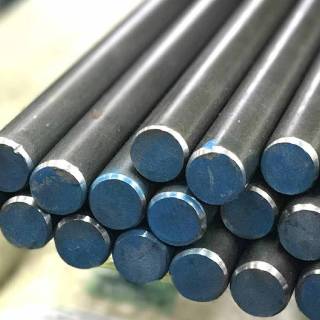
Alloy Steel Round Bar
Alloy Steel Round Bars are produced by mixing carbon steel with other alloying elements such as chromium, molybdenum, and nickel. This improves their strength, toughness and heat and wear resistance, which makes them suitable for heavy-duty, and high-temperature applications.
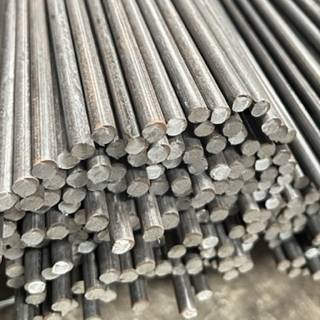
Mild Steel Round Bar
Mild Steel Round Bars are low-carbon steel rounds with excellent weldability, ductility and machinability. They are utilized in fabrication, construction activities and light engineering work because of their versatility and affordability.
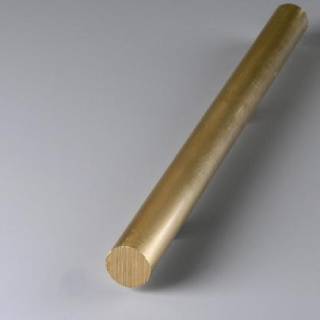
Brass Round Bar
Brass Round Bars possess great corrosion resistance, high conductivity, and an aesthetically pleasing finish. These bars are commonly employed in decorative hardware, plumbing devices and electrical applications because of their machinability and aesthetic appeal.
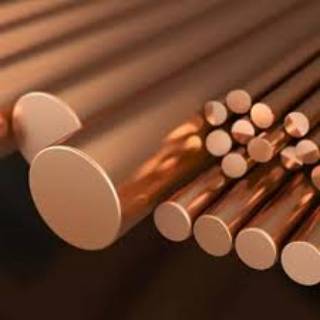
Copper Round Bar
Copper Round Bars are highly conductive and corrosion-resistant, making them ideal for electrical and thermal applications. Their natural antimicrobial activity also makes them suitable for use in medical and architectural environments.
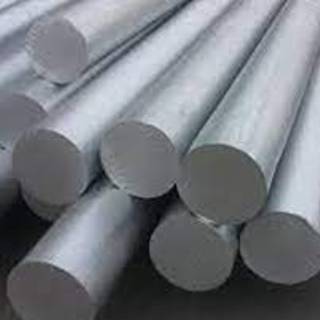
Aluminum Round Bar
Aluminum Round Bars are light, corrosion resistant, and easy to machine. These bars are commonly used in aerospace, transportation and structural applications where weight reduction and strength are paramount.
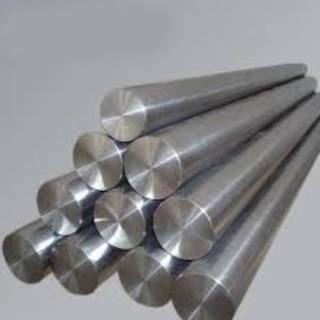
Titanium Round Bar
Titanium Round Bars provide a great strength-to-weight ratio, corrosion resistance, and biocompatibility. They are frequently employed in aerospace, medical implants and marine applications where performance, and toughness are critical.
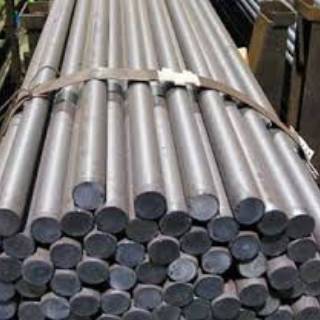
Nickel Round Bar
Nickel Round Bars possess excellent heat, corrosion, and oxidation resistance. They are well suited for high-stress and high-temperature applications such as chemical processing, power generation, and marine engineering.
Round bars and rods play a crucial role in various industries due to their strength, durability, and versatility. These components are widely used in manufacturing, construction, and engineering applications, providing essential support and functionality across multiple sectors.
Oil & Gas Industry: The round bars and rods are used in drilling equipment, pipelines, and structural components due to their high strength, corrosion resistance, and ability to withstand extreme environments. They ensure reliability in offshore and onshore oil extraction.
Power & Energy Sector: In power plants and renewable energy systems, round bars and rods are essential for turbines, generators, and transmission components. Their heat resistance and mechanical strength make them ideal for nuclear, thermal, and hydroelectric applications.
Water Treatment Plants: Corrosion resistant round rods and bars are utilized in valves, pumps, and filtration systems in water treatment plants. Their strength and non-reactive properties provide safe and effective operation in severe chemical and salt environments.
Chemical & Petrochemical Industry: Round bars and rods are critical for processing equipment, pressure vessels, and heat exchangers, where they withstand high temperatures, pressure, and corrosive chemicals. Materials like stainless steel and nickel alloys enhance longevity in chemical processing.
Food & Beverage Industry: Hygienic and corrosion resistant round bars are applied in food processing equipment, storage tanks, and conveyor belts. Stainless steel grades like 304 and 316 provide food safety compliance and easy sanitization.
Marine & Shipbuilding: Round bars and rods important part for shipbuilding and offshore construction because of their tensile strength and seawater corrosion resistance. They find applications in propeller shafts, deck fittings, and marine fasteners.
HVAC & Fire Protection: Round bars in HVAC and fire protection systems are used in structural support, ducting, and fire suppression equipment components. They provide safety and efficiency in commercial and industrial buildings via heat and corrosion resistance.
In conclusion, round bars and rods are important in numerous industries, offering high strength, corrosion resistance, and versatility. Whether for heavy-duty infrastructure, precision components, or specialized applications, their reliability and performance make them a preferred choice across various sectors.
Silver Tubes is a leading manufacturer and supplier of Round Bars, Rods, and Wires, delivering precision-engineered solutions tailored to industry needs. Our advanced manufacturing plants provide high-quality production with advanced technology, supplying both standard and customized sizes to fit various applications. We are also certified in ISO 9001, PED, ASTM, ASME, DIN, and EN 10204 3.1/3.2, assuring various quality controls with strict inspections, material traceability, and complete adherence to global standards. We provide a wide range of materials and grades, including stainless steel, carbon steel, alloy steel, and nickel alloys, ensuring durability and performance in various industrial sectors.
Our products come with proper marking, high-quality packaging, and certification reports, ensuring authenticity and reliability. With competitive pricing, bulk availability, and cost-effective solutions, we offer affordability without compromising quality. Additionally, our fast delivery services and global supply network enable us to meet urgent project requirements efficiently. Choose Silver Tubes for trusted quality, precision engineering, and seamless global service.
The price of Stainless Steel Round Bar per kg in India varies based on grade, size, and market conditions.
| GRADE | SIZE in MM(BLACK ROUND BAR) | RATE IN INR | RATE IN USD M/TON | GRADE | SIZE in MM (BLACK ROUND BAR) | RATE IN INR | RATE IN USD M/TON |
| 304 | 4 to 20 | 150 | 2143 | 304L | 4 to 20 | 155 | 2214 |
| 304 | 21 to 40 | 150 | 2143 | 304L | 21 to 40 | 155 | 2214 |
| 304 | 41 to 60 | 145 | 2071 | 304L | 41 to 60 | 150 | 2143 |
| 304 | 61 to 80 | 145 | 2071 | 304L | 61 to 80 | 150 | 2143 |
| 304 | 81 to 100 | 145 | 2071 | 304L | 81 to 100 | 150 | 2143 |
| 304 | 101 to 120 | 145 | 2071 | 304L | 101 to 120 | 150 | 2143 |
| 304 | 121 to 140 | 145 | 2071 | 304L | 121 to 140 | 150 | 2143 |
| 304 | 141 to 160 | 150 | 2143 | 304L | 141 to 160 | 155 | 2214 |
| 304 | 161 to 180 | 150 | 2143 | 304L | 161 to 180 | 155 | 2214 |
| 304 | 181 to 200 | 150 | 2143 | 304L | 181 to 200 | 155 | 2214 |
| 304 | 201 to 220 | 150 | 2143 | 304L | 201 to 220 | 155 | 2214 |
| 304 | 221 to 240 | 155 | 2214 | 304L | 221 to 240 | 160 | 2286 |
| 304 | 241 to 260 | 155 | 2214 | 304L | 241 to 260 | 160 | 2286 |
| 304 | 261 to 280 | 160 | 2286 | 304L | 261 to 280 | 165 | 2357 |
| 304 | 281 to 300 | 160 | 2286 | 304L | 281 to 300 | 165 | 2357 |
| 304 | 300 to 320 | 160 | 2286 | 304L | 300 to 320 | 165 | 2357 |
| 304 | 321 to 340 | 165 | 2357 | 304L | 321 to 340 | 170 | 2429 |
| 304 | 341 to 360 | 165 | 2357 | 304L | 341 to 360 | 170 | 2429 |
| 304 | 361 to 380 | 165 | 2357 | 304L | 361 to 380 | 170 | 2429 |
| 304 | 381 to 400 | 170 | 2429 | 304L | 381 to 400 | 175 | 2500 |
| 316 | 4 to20 | 195 | 2786 | 316L | 4 to20 | 200 | 2857 |
| 316 | 21 to 40 | 195 | 2786 | 316L | 21 to 40 | 200 | 2857 |
| 316 | 41 to 60 | 195 | 2786 | 316L | 41 to 60 | 200 | 2857 |
| 316 | 61 to 80 | 195 | 2786 | 316L | 61 to 80 | 200 | 2857 |
| 316 | 81 to 100 | 205 | 2929 | 316L | 81 to 100 | 210 | 3000 |
| 316 | 101 to 120 | 205 | 2929 | 316L | 101 to 120 | 210 | 3000 |
| 316 | 121 to 140 | 205 | 2929 | 316L | 121 to 140 | 210 | 3000 |
| 316 | 141 to 160 | 205 | 2929 | 316L | 141 to 160 | 210 | 3000 |
| 316 | 161 to 180 | 210 | 3000 | 316L | 161 to 180 | 215 | 3071 |
| 316 | 181 to 200 | 210 | 3000 | 316L | 181 to 200 | 215 | 3071 |
| 316 | 201 to 220 | 210 | 3000 | 316L | 201 to 220 | 215 | 3071 |
| 316 | 221 to 240 | 215 | 3071 | 316L | 221 to 240 | 220 | 3143 |
| 316 | 241 to 260 | 215 | 3071 | 316L | 241 to 260 | 220 | 3143 |
| 316 | 261 to 280 | 215 | 3071 | 316L | 261 to 280 | 220 | 3143 |
| 316 | 281 to 300 | 220 | 3143 | 316L | 281 to 300 | 225 | 3214 |
| 316 | 300 to 320 | 220 | 3143 | 316L | 300 to 320 | 225 | 3214 |
| 316 | 321 to 340 | 220 | 3143 | 316L | 321 to 340 | 225 | 3214 |
| 316 | 341 to 360 | 230 | 3286 | 316L | 341 to 360 | 235 | 3357 |
| 316 | 361 to 380 | 230 | 3286 | 316L | 361 to 380 | 235 | 3357 |
| 316 | 381 to 400 | 230 | 3286 | 316L | 381 to 400 | 235 | 3357 |
The HSN code for round bars varies depending on the material. For stainless steel round bars, the common HSN code is 7222, 7214 or 7228.
Round bars are generally stronger in torsional and bending applications, making them ideal for shafts and load-bearing structures. However, square bars provide higher resistance to deformation in structural frameworks due to their increased surface area and edge strength.
Several factors influence the price of stainless steel round bars, including:
Yes, stainless steel round bars can be customized in terms of length, diameter, and finish based on industrial requirements. Silver Tubes offers custom cutting, machining, and finishing services.
The weight of a round bar can be calculated using the formula: Weight (kg)=π4×Diameter2×Length×Density\text{Weight (kg)} = \frac{\pi}{4} \times \text{Diameter}^2 \times \text{Length} \times \text{Density} For stainless steel (density ~ 7.85 g/cm³), the simplified formula is: Weight (kg/m)=0.006165×Diameter2\text{Weight (kg/m)} = 0.006165 \times \text{Diameter}^2 (Where Diameter is in mm)
Before purchasing, ensure the round bars come with quality certifications like ISO
9001 (Quality Management), EN 10204 3.1/3.2 (Material Traceability),
ASTM / ASME Compliance, PED (Pressure Equipment Directive) and Ultrasonic Testing (UT) and
Non-Destructive Testing (NDT) Reports.
These certifications ensure quality, durability, and compliance with
international industry standards.